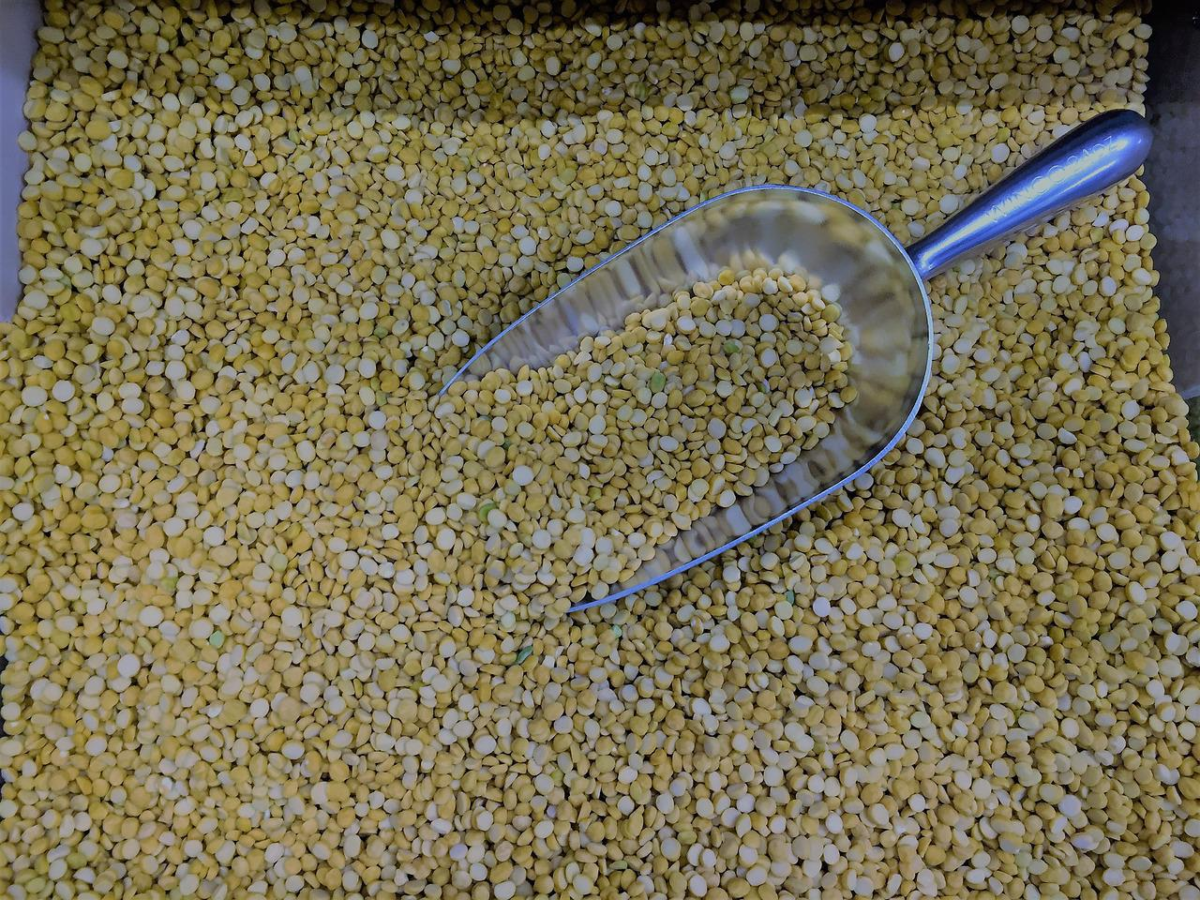May 10, 2022
By Michelle Pelletier Marshall, Unconventional Ag Media
(This story first appeared in our sister publication, Unconventional Ag News)
NOTE: This year’s Unconventional Ag conference, which will take place Nov. 29-30 in Minneapolis, includes a tour of the PURIS Innovation Center. The tour will include an inside look at scaling a sustainable food future, a plant-based tasting, and time with PURIS experts to discuss innovation within both food and agriculture. Learn more here.
Joy…integrity…choice…these comprise the foundation upon which PURIS, a cultivator of organic, non-GMO, U.S.-sourced plant-based ingredients and foods, and the largest pea protein producer in North America, was built. Starting out in Iowa in 1985 with a mission to restore knowledge, control, and trust to the global food system, PURIS has made its mark in the global pea protein sector, a market projected to grow at a CAGR of 11.9 percent to reach $2.9 billion by 2027.
The company, headquartered in Minneapolis, Minnesota, has grown considerably and now has 370 employees, two production plants and four grain handling and milling facilities, and continues to build relationships in the sector. It formed a joint venture in 2018 with Cargill to accelerate the production of plant-based food, and the following year, secured an additional $75 million investment from Cargill.
In July 2018, PURIS raised a $12.5 million Series D round of funding from a single undisclosed investor, and also caught the eye of Beyond Meat, an innovative food tech producer of plant-based meat substitutes, and is a major provider of pea protein for the company’s products.
And while there initially was some challenge convincing customers of the value of pea protein, the burgeoning number of products that make use of the legume – meat-free burgers and hot dogs, dairy-free cheese, pea “milk”, pea-based gins, edible packaging, and many others – just keeps expanding.
To learn more, we spoke to Nicole Atchison, who is CEO of PURIS Holdings with responsibility for leading innovation and business development across PURIS’ portfolio of companies.
1). The PURIS name is synonymous with pea protein, but the company also produces non-GMO soybeans and lupin, among others. Please provide more about the scope of your business offerings.
PURIS is about vertically integrated plant-based food, and that’s the journey that we’ve been on since the 80s. Our roots and heritage go back to the seed, and that includes pea seeds and different types of soybeans, all with unique attributes. We also have a corn program, and a thriving breeding program, developing new non-GMO seed stocks for our farmer base.
We take those seeds and process them into various types of foods. Whether it’s texturized proteins or plant-based eggs, PURIS is really three pillars: it’s agriculture and agtech – seeds, origination, farmer relations; ingredient processing – pea proteins, fibers, and starches that we sell on a large scale to food manufacturers – and then food technology.
In the food tech pillar, we partner hand-in-hand with customers, and sometimes even with our own internal teams to bring new plant-based foods to market – from plant-based dairy, meat, and eggs, to snacks and full meals, we really touch the entire spectrum of different types of food products.
We’re excited to see the progress in this area because when we started 12 years ago selling pea protein, it was a mostly unknown entity in food production. While it was used heavily in pet food and feed, we had to do a lot of work to convince people to try it. We think there’s still a lot more potential for how you can use peas, and not just the protein, but the fibers and the starches, to get that full value creation from a pea.
2). PURIS is often called a game changer in terms of taste and vertical integration in pea protein. Can you please explain this further?
When we first started making pea protein, the state-of-the-art was products where it was a trade-off – if you were going to use pea protein rather than soy protein, the taste and functionality was not optimized, and so it was a concession. Our challenge was to make our pea protein taste as great as the best soy protein on the market, so we spent a long time in the R&D phase and pilot production trying to figure out how to make pea protein taste great.
We looked at genetics – how can we breed peas that have a blander flavor and higher protein – and also addressed how to make them more robust economically. We utilized technology and our operations to bring forth these quality products that leverage all of our vertically integrated supply chain to ensure we have the most optimal functionalities. This allows our partners on the food manufacturing side to have a neutral palette from which they can create. We are really proud that we have a great tasting product that is extremely neutral in flavor, and can make even the simplest vanilla or original flavors something that people will really enjoy and appreciate for the benefits of plant-based nutrition that is better for them and better for the environment, without compromise.
There are challenges, of course. One is around crop insurance for specialty crops, which is severely lacking and limited. That does create a barrier for trial, and for producers to take a risk. We’re working to address this, but for now PURIS helps by providing that contract for the production so that farmers know that the crop’s not going to remain unsold in their bins.
3). Growing peas helps regenerate the land and is a sustainable choice. How does this fall in line with the latest in advancing organic farming and reducing the carbon footprint of agriculture?
What’s changing now is it’s not just organic farmers, it can be a conventional farmers’ tool too to help build soil health. When we started breeding peas in the 90s, it wasn’t with the grand intention that 20 years later, we would be selling pea protein; it was that peas are this really wonderful tool for farmers. We sought to develop peas that could grow robustly in all sorts of environments, not just in the very Northern Plains or in Canada, but also in Iowa and Kansas and Arkansas. So we developed peas with heat tolerance and disease tolerance, and were able to take advantage of the fact that peas are a shorter season crop – about 90 days – and are cool tolerant, meaning you can plant them earlier in the season (and in some areas, this allows the potential for a double crop), and they’re a nitrogen fixator and carbon sequester. All of this provides more flexibility to farmers who each have his/her own methods for growing and crop rotation.
Additionally, peas are a foundation food that has a much lower environmental footprint than what it’s typically replacing, whether that’d be meat, eggs, or dairy. By creating great tasting foods from this sustainable source, we can create the foundation of what we call a sustainable food system.
There are a lot of different opportunities for growers – whether they’re a conventional corn and soy cropping rotation only, or if they are a seven crop, 30-year organic operation – peas can work in all of these situations. PURIS is a market for those peas, so where farmers used to feel it’s a cover crop, or a rotation where you’re investing, now they can also get a return because we’re going to purchase that “cover crop”, from the farmer, making it a cash crop as well.
4). Your 200,000-square-foot plant in Dawson, Minnesota, doubled your pea protein production in 2021. How has this changed the playing field for PURIS, as well as plant-based offerings?
We opened the Dawson site in late 2021. It was a three-year journey of engineering and construction, made especially difficult because of COVID, which saw us trying to hire 100 people in a town with only 1,000 residents. It was definitely challenging.
But the end result is that we have large-scale production of both pea protein and starch that has allowed us to double capacity. We’re the first in North America with a two-plant model, which is really for redundancies and supply chain resilience, but also allows us to have the largest capacity in North America. Additionally, it’s a large plot of land, so we can grow and expand in the future, as demand continues to increase.
What this new location means for our business is that we can now work with more farmers, source more peas, and we can grow our system because we’ve addressed the bottleneck in the industry, which is infrastructure. Our investment into infrastructure is our commitment that we believe that the long-term potential for plant-based products is strong, and that we’re in for the long haul.
5). The company was founded on your parents’ vision to change the global food system. Speak to us about the closed-loop food production system uniting organic and non-GMO seed, sustainably grown crops, and clean ingredient manufacturing that was envisioned, and how much progress has been made.
It was my father who was the visionary for the business (Note: He’s still in the business as chairman of the board, and is active in overseeing the company’s seed breeding processes). He said “we are going to build a vertically integrated plant-based food company” – and everyone was like, what is that?
He could see the inefficiencies of the animal-based food system with so much grain going into animals. His thought wasn’t necessarily that people shouldn’t and can’t eat animal protein, but that they would also need to eat more plant-based protein, so we should make it taste good. It was as simple as that. The business we run today, crazy enough, is almost exactly what his vision was.
And he is always pushing us to go to that next level of closing the loop, and how do we continue to push the boundaries on what’s possible? But we’ve really been marching along a very intentional journey of creating the system that we have today. Our parents bootstrapped the business for a long time. It didn’t happen overnight. We’ve heard a lot of “PURIS is an overnight success”, but that couldn’t be farther from the truth. It’s been a long, slow journey. It’s been about building that foundation of each step along the chain before going on to the next one.
What we’re excited to do now is determine how we can take the foundation that we’ve built, and the systems and the process and the macro economics that are changing around us as well, and expand what we’re doing into other world areas or categories. Or go deeper in things that we’ve started, but have only used for our own system. How can we leverage our genetics across more acres, instead of just the ones that we’re buying? How can we work across different protein sets or different world areas to establish the foundations of this?
Globally, the world needs to eat more plant-based nutrition. And over the next 30 years, there’s going to need to be a significant investment in both what we grow and how we process it. If we want to reach our sustainability goals as a population, we have to think that way. We don’t think in five-year increments; we think in 30-year increments.
6). What’s on tap for other innovations and next steps for PURIS?
On the ingredient front, we have a lot of really cool innovations in the hopper, which will be announced soon. On the protein side, we have been working on fruit-based applications where people want protein. We also are launching a pea syrup, which can be used as a replacement for tapioca or brown rice syrup in snack bars and cereals and similar products.
As far as food technology, we recently launched a new consumer-facing product – our first ever out of our PURIS portfolio – it’s a brand called Acre-Made, which is a plant-based egg. It’s a shelf-stable powder product that once blended with water and cooked, looks and tastes like an egg. We debuted it at Expo West in March, and the product will be available in the market in the second half of this year.
We also commercialized a couple new products this year. One is called our Bite+ Protein, which is a protein specifically designed for meat applications. We also have an entirely different protein that was commercialized for beverage applications named 2.0. Then we announced that we have Upcycled™ certification for our pea starch, which is a new certification touching upon some of the consumer requirements around wanting to limit food waste and support products that are keeping food in the food system, rather than adding it to the waste system.
As a final note, I’d like to speak to resiliency. We need diversity of food sources so that we’re not too reliant on a single source(s) for our nutrition. While animal protein is likely to play a role in global nutrition for a long time, we need to diversify our protein sources so that when there are disruptions in the system (pandemics, bird flu, extensive farming practices, etc.), that we are able to feed our populations from other sources as well. That’s why I’m so passionate about what we’re doing, because it’s not just about the health of humans and the planet, it’s about food security and ensuring that we have that ability to feed people. And, if we can do that sustainably, all the better.
ABOUT NICOLE ATCHISON
 Nicole Atchison, Ph.D. is CEO of PURIS Holdings with responsibility for leading innovation and business development across PURIS’ portfolio of companies. This includes ingredient technologies, processing technologies, seed genetic strategies, product development, and go-to-market strategies, insights, and support for plant-based brands.
Nicole Atchison, Ph.D. is CEO of PURIS Holdings with responsibility for leading innovation and business development across PURIS’ portfolio of companies. This includes ingredient technologies, processing technologies, seed genetic strategies, product development, and go-to-market strategies, insights, and support for plant-based brands.
PURIS™, a family-owned company founded in 1985 in Oskaloosa, Iowa, develops and supports continued innovation in a spectrum of pure, plant-based foods and ingredients from U.S.-based organic and non-GMO sources. Atchison is the daughter of the founders of the company.
Previously, she held roles as project manager and engineer and was responsible for leading the cross-functional team through FDA approval and U.S. commercialization of Stellarex 035, a Class III medical device, for Spectranetics/Covidien. Stellarex launched in 2017, followed by an acquisition of Spectranetics by Phillips.
Atchison holds a Ph.D. in biomedical engineering from the University of Minnesota, and a bachelor of science in chemical engineering from Iowa State University.
*The content put forth by GAI News and its parent company HighQuest Partners is intended to be used and must be used for informational purposes only. All information or other material herein is not to be construed as legal, tax, investment, financial, or other advice. GAI and HighQuest Partners are not a fiduciary in any manner, and the reader assumes the sole responsibility of evaluating the merits and risks associated with the use of any information or other content on this site.
 – Michelle Pelletier Marshall is contributing editor and author for HighQuest Partners’ GAI News and Unconventional Ag, and managing editor for its WIA Today blog. Additionally, she is the company’s Senior PR/Media Manager. She can be reached at marshall@highquestpartners.com.
– Michelle Pelletier Marshall is contributing editor and author for HighQuest Partners’ GAI News and Unconventional Ag, and managing editor for its WIA Today blog. Additionally, she is the company’s Senior PR/Media Manager. She can be reached at marshall@highquestpartners.com.

Let GAI News inform your engagement in the agriculture sector.
GAI News provides crucial and timely news and insight to help you stay ahead of critical agricultural trends through free delivery of two weekly newsletters, Ag Investing Weekly and AgTech Intel.




